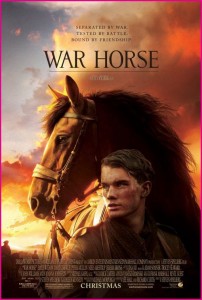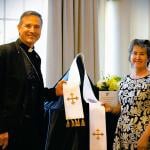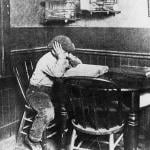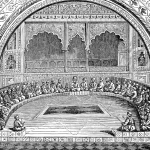 Though it might seem counterintuitive because of the title, the Christopher Award-winning film “War Horse” is actually about humanity.
Though it might seem counterintuitive because of the title, the Christopher Award-winning film “War Horse” is actually about humanity.
“War Horse” begins in rural England where a teen named Albert befriends, tames, and trains a horse he names Joey after his father buys him in an auction. When the horse is eventually sold to a member of the British military to take part in World War I, Albert is devastated. He promises he will find Joey and reunite with him some day, even if he has to enlist as a soldier himself.
The film then follows Joey through various experiences depicting the death and devastation that the war wrought – only we’re seeing it through a horse’s eyes. Yet everywhere Joey winds up, he finds someone with a kind heart who looks after him. This, to me, is the essence of the movie.
Though most of the soldiers aren’t developed much as characters – and there are always a callous few – there are also those on both sides of the conflict whose decency shines through by caring for Joey. In an environment where human beings treat each other like animals, it is ironically an animal that draws out the best of the soldiers’ humanity.
In the most poignant example, Joey tries to flee from the war, charging through barbed wire barricades that completely entangle him and knock him to the ground. In danger of dying from his wounds, he is trapped in “no man’s land” between the British and German trenches. Soldiers on both sides spot him, and are moved by the horse’s plight. A Brit named Colin emerges from his trench and moves toward the horse waving a white flag while reciting “The Lord is my shepherd,” hoping the German’s will allow for a momentary truce. When he sees the horse up close, Colin laments that he didn’t bring along gloves or something to cut the wire. Suddenly, a German soldier appears behind him holding out a pair of wire cutters, saying, “I thought perhaps you might need these.”
Reluctantly trusting each other through their common goal of freeing the horse, the two enemy soldiers work together to cut Joey free. They even manage to joke around a little while they’re working:
Colin: So how’s things in yonder trench?
Peter: Delightful. We read, we knit sweaters, and we train our rats to perform circus tricks.
Colin: Well, if ever you need any more rats, we can always send ours over. `Cause we’ve more than we need, strictly speaking. Besides, they scare off all the pretty girls.
After finally freeing the horse, the two soldiers both want to take him. Still not knowing each others’ names, Colin calls the German, “Fritz.” He answers, “My name is not Fritz. It is Peter.”
Colin then shares his name as well. Being on a first-name basis breaks down whatever barriers were left between the two. They flip a coin for the horse and Colin wins. As the two part ways, Peter tosses Colin the wirecutters and jokingly says, “A pair of German cutters – in memory of your handsome friend from Dusseldorf.”
Smiling, Colin responds, “I’ll use `em back in the garden in South Shields. You keep your head down, now, Pete me lad!”
The two men essentially end the scene as friends, having briefly gotten in touch with the better angels of their nature because of Joey. Though it doesn’t do so graphically, “War Horse” depicts the dehumanizing brutality of war. But as in the aforementioned scene, it also reminds us of the goodness inside each of us – and the common bonds between us – that war often obscures.
In addition, “War Horse” is simply an engaging story throughout, filled with majestic and stunning cinematography. The closing shots are especially beautiful, reminding me of one of my favorite movies: John Ford’s “The Searchers.” It’s another great production from Steven Spielberg,and we are pleased to honor it with a Christopher Award.
COME BACK TO THE BLOG TOMORROW, TUESDAY APRIL 3, FOR INFORMATION ON HOW YOU CAN WIN A DVD COPY OF “WAR HORSE.”















